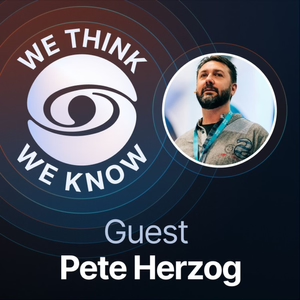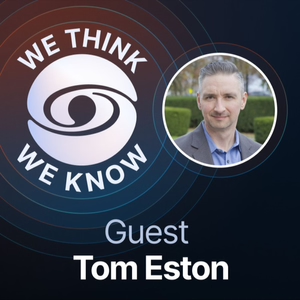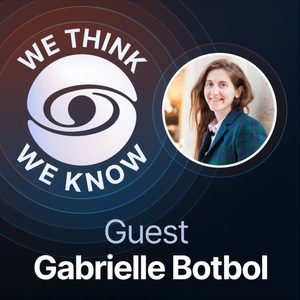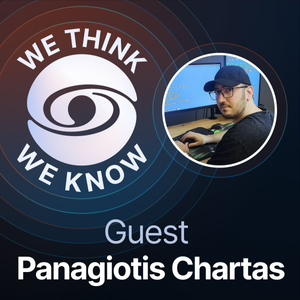
We think we know
Pentest-Tools.com
All episodes
Best episodes
Seasons
Top 10 We think we know Episodes
Goodpods has curated a list of the 10 best We think we know episodes, ranked by the number of listens and likes each episode have garnered from our listeners. If you are listening to We think we know for the first time, there's no better place to start than with one of these standout episodes. If you are a fan of the show, vote for your favorite We think we know episode by adding your comments to the episode page.

We think we know how to build differentiating skills in offsec
We think we know
01/16/24 • 54 min
There’s a constant loop of learning, doing, and improving in offensive security. And one way to develop the “muscle” to tackle complex security challenges is through hands-on training. That’s what IppSec, our guest, does with kindness, passion, and in the community’s best interest.
IppSec helps us bust a couple of common myths which, if left unquestioned, may alter learning, distort results, and, ultimately, create big gaps in understanding, all of which can undermine your future success.
Press play to listen to IppSec explain:
- Why recon requires constantly "reading between the lines" [03:20]
- Why AI can’t find business logic vulnerabilities [08:23]
- Why genuine communication with clients is essential [12:48]
- How rewarding and valuable it is to invest in the open-source community [17:35]
- How discipline makes a difference and how to develop it [24:00]
- How pentesting and bug bounty hunting complement each other [27:00]
- How you can build specific skills that differentiate you in the community [35:36]
- How to develop your own learning system [38:04]
- Why it matters to make constant learning a positive experience [44:48]
IppSec’s generosity to share so many practical, valuable examples will help you get a better understanding of this discipline and enhance your knowledge.

01/02/24 • 53 min
Ready to excel in offensive security this year? Delve into the mind of Vivek Ramachandran, a cybersecurity virtuoso who’s seen (and learned) a lot in this field.
He's a force that fuels both his current company and the broader cybersecurity landscape with original thinking, educational and actionable insights.
And there's more to Vivek than just technical savvy. He's on a mission to revolutionize how we view ethical hackers and infosec pros, using his captivating comic books to challenge cliches and spark a new wave of enthusiasm in the next generation.
Tune in for this insightful episode with Vivek to find out:
- Why people mistakenly equate offensive security with functional testing [04:36]
- How (and why) the Hackers: Superheroes of the Digital Age comics came to be [07:13]
- Why first principles are essential in mastering and elevating security concepts [12:31]
- How to build your career on curiosity, gut feeling, generosity, and perseverance [19:33]
- Why we need human ingenuity as the nature of what we automate changes [29:10]
- What an entrepreneurial adventure will teach you about yourself - and others [43:45]
- How being part of the infosec community changes your work, thinking, and career [51:00]
Vivek’s vast career is a rich source of inspiration if you’re ready to practice extreme ownership, radical candor, and achieve the kind of alignment between your principles and actions that will propel your work and life to the next level.
Resources from this episode:
- Vivek on LinkedIn
- Vivek’s story in cybersecurity
- Comic books - Hackers: Superheroes of the digital age
- Vivek on the Philip Wylie Show
- Advanced Wi-Fi security with Vivek at DEF CON 23
- Training courses on Pentester Academy
- OSI model layers

12/05/23 • 54 min
“There is no end goal in this industry. You're always going to keep moving forward.”
This quote from our guest does a great job at capturing the conversation we explore in this podcast: the love for the process, the hunger for knowledge, how to add value for clients, and become a better penetration tester.
For the third episode of We think we know, we welcome Tim Connell, an enthusiastic penetration tester and the Director of Cybersecurity Services at Pulsar Security, to explore the most common security testing myths and misconceptions.
Tim shares some practical tips and examples that spotlight his commitment to continuous learning and community contribution. His enthusiasm and genuine dedication to this space are so inspiring - that we hope will lift you and get better at what you do.
So join us on We think we know, as we unpack the layers and narratives shaping offensive security work.
Listen to the new episode to find out:
- Why it’s essential to really understand what each customer needs from their pentest [08:31]
- How to improve your workflow by making some of it replicable [21:33]
- Why it matters to learn as much as you can and use that to deliver better work [33:05]
- How to speed up your learning process by building stuff and looking deeper into vulnerabilities [41:21]
- Why (and how) visual representations boost clear communication in penetrating testing [46:31]
- The perks of being more involved in the community, being resourceful, and keeping your motivation to move forward [50:05]
At the end of it, you’ll walk away with many valuable lessons to use in both your life and career. Let us know which hit home for you!
Resources from this episode:
- Tim on LinkedIn
- His journey from Sales to Director of Offensive Security on the Cybersecurity Recruiter podcast
- Tim on hacking a Wi-Fi network password in 2 seconds on the Pulsar Security blog

11/21/23 • 52 min
It’s not just penetration testing, just like today’s guest is not just an offensive security pro.
If you’re the ambitious type who’s always up for new challenges, then you’re most likely going to resonate with today’s guest and his approach.
Experienced penetration tester and Volkis co-founder, Alexei Doudkine joins us in the second episode of the podcast to debunk pentesting misconceptions.
With 10+ years of offensive security experience under his belt and his learnings as a business owner, Alexei challenges the status quo to get other hackers to walk a mile in their clients' shoes.
You’ll also hear Alexei unpack the skills and mindset it takes to deliver quality in penetration testing and become a better ethical hacker. Some of these ideas may make you uncomfortable - and that’s why we believe they’re worth listening to.
Whether it’s about absorbing technical complexities like a sponge or developing an intuitive perception of vulnerabilities, this conversation highlights the aspects of penetration testing that make it a true craft.
So, come along with us on We think we know, as we unpack the layers and narratives shaping offensive security work.
In this episode, you’ll learn:
- Why it’s not about data, but how you use it and the human impact behind it. [12:24]
- What it takes to develop your hacker intuition that tells you there’s something there - even before you have proof [15:25]
- Why automation is not the problem, but using it as a standard checkbox in your engagements is [19:00]
- How to use learning to also stay humble, rooted in the here and now [27:30]
- Why it’s worth prioritizing people over security testing during tougher economic times [44:45]
- The perks of being uncomfortable, hungry for learning, and doing your best work [49:20]
By the end of this episode, you'll look at your work - and the infosec community - with fresh eyes.
Resources from this episode:
- Alexei on Linkedin
- Alexei’s hacker origin story on the Volkis blog
- Alexei on the Cyber Empathy podcast - Ep. 5, Season 1
- The Volkis Independence Policy
Listen to this episode on:

We think we know how to explain the value of a penetration test
We think we know
11/07/23 • 54 min
Welcome to the kick-off episode of the We think we know podcast!
Whether you’re looking for a fresh perspective, to learn about and from our guest, or just to see if this podcast is worth your time, thanks for choosing to spend some time with us! We don’t take it for granted.
Today, we've got the fantastic Alethe Denis with us. Wearer of many hats and a generous contributor to the cybersecurity community, Alethe’s work covers a broad range of offensive security, from pentesting to social engineering, and red teaming, including tabletop exercises.
In 2019, Alethe took home the top prize at the prestigious DEF CON Social Engineering CTF. She later snagged a DEF CON Black Badge, becoming a go-to social engineering expert and cybersecurity ally for companies around the world.
Sharing examples from her real-world experience, Alethe helps us break down a stubborn misconception: that penetration testing is merely a commodity, another box to tick off for compliance.
By all means, this is not a new issue in offensive security. But it is a persistent one.
When seen as a commodity, pentesting undervalues expertise, it lowers pay, leads to superficial testing scopes, and reduces the satisfaction penetration testers get from their work.
That’s why we’re talking about it.
Alethe offers very practical tips and language you can use to highlight the value of your work and the nuances it involves.
You’re in for a treat!
Hacker's toolbox from this episode:

Welcome to We *think* we know!
We think we know
11/06/23 • 0 min
🤩 We’re launching a podcast!
On Nov. 7, the first episode of We Think We Know will be in your headphones!
Here's the low-down:
🤔 What is it about?
Learning how to be better hackers by challenging assumptions and digging deeper into the why, how, and what of offensive security. In the 1st season, we're unpacking why #penetrationtesting is a craft and *not* a commodity.
🎤 Who’s gonna be on?
Some of the best #offensivesecurity professionals, who joined us to reveal their unique skills, traits, and real-world experiences in a way that directly fuels your growth.
😎 What’s in it for me?
Thought-provoking ideas, practical advice you can use straight away, battle-tested advice on how to present your work and develop your career.
👉 Why are *we* doing this?
Because we care deeply about the people in this community and the work they do.
Because we believe that learning from each other is what made #ethicalhacking what it is today - and what it keeps it evolving.
Because there are a lot of hackers whose stories can educate and inspire others, both new to this field and already committed to it.
📌 If you want to find out the moment We *Think* We Know comes out, subscribe to our Youtube channel: https://www.youtube.com/@PentestToolscom/podcasts

We think we know hackers thrive on deep environment knowledge
We think we know
04/09/24 • 73 min
“Not everything works as configured. Not everyone behaves as trained.”
The reality of this statement makes it possible for us, the people in offensive security, to have a job. It also highlights how unpredictable our work can be and how never-ending our learning process is.
We work in a space where things are so complex that we need to combine big-picture, higher-level thinking with boost-on-the-ground practice.
And our guest today is brilliant at doing just that.
Pete Herzog has spent over two decades distilling the fundamental principles of security testing, turning them into a decade-defining manual - the Open Source Security Testing Methodology Manual (OSSTMM). Pete brings offensive and defensive security concepts together to break down important misconceptions.
Listen to this conversation to uncover:
- Why you can’t do security without understanding the process behind it [08:23]
- How automation can help but, at the same time, hurt the ones using it [11:00]
- Why you can’t rely only on automated security tools in your pentests [19:10]
- The importance of implementing security controls to change the environment [28:22]
- Pete’s perspective on "Zero Trust" and how they tackled this ion OSSTMM [35:18]
- Why he thinks there are “too many parrots, not enough pirates” in this space [43:42]
- The excitement of researching for OSSTMM v4 and exploring new technologies [51:40]
From the expert systems behind AI-driven tools and their blindspots to generalizations that hurt offensive security outcomes, we explore key elements that shape today’s problems - some of which you’re probably wrestling with as well.
Let’s explore them!

We think we know what makes a good pentester
We think we know
03/12/24 • 51 min
With 20+ years of cybersecurity work, Tom unpacks the complexities of penetration testing, discussing the roles of vendors, practitioners, and technological advancements.
He also shares his perspective on what makes a good pentester, the value of mentorship, and the ethical challenges in this line of work.
Explore this conversation to learn:
- How pentesting changed over the years and who’s shaping it [03:02]
- How to avoid burnout and deal with imposter syndrome [09:13]
- Why he seeks and values mentorship for personal and professional growth [19:44]
- The importance of constant learning and networking with your peers [23:23]
- How compliance brings down the value of pentesting and what to do about it [30:04]
- How cultivating range can help you in your pentesting career [37:24]
- How to set healthy boundaries to protect your health [41:11]
This episode with Tom is a must-listen if you want to learn how to showcase your work and elevate your thinking and tactics.
Resources from this episode
- Tom’s personal website
- Tom on LinkedIn
- Tom on Twitter
- The Shared Security podcast
- The People Hacker book by Jenny Radcliffe
- Tom’s journey from offensive security to leadership at the Phillip Wylie Show
- Ethical hackers and the legacy of the hacker manifesto for Cyber Empathy
- Tib3rius
- Jason Haddix
- Dave Kennedy

We think we know you can't attack what you don't understand
We think we know
03/26/24 • 54 min
In this episode, we continue to ask the meaningful questions:
- What makes a great pentester?
- How can you balance the art of manual testing with the efficiency of automation?
- What is the unique value that pentesters bring to offensive security?
- And what can't be commoditized in this craft?
Gabrielle's mantra, “action for cyberpeace”, resonates through her work, and today, she shares her journey, experiences, and the lessons that shaped her career so far.
Key highlights from this conversation:
- What specific skills do you need to be a great penetration tester [02:45]
- How self-learning and consistency help you achieve your goals [07:55]
- Why she values team collaboration to deliver the best work you can do [13:57]
- How she got into cybersec and why she strives for cyberpeace [24:35]
- How to find balance between your personal life and your work [28:37]
- When automation is effective in pentesting and where that ends [32:02]
- How to set healthy boundaries to protect your personal life and health [41:11]
- Which hobbies juggle her curiosity and broaden her horizons [51:59]
Give this episode with Gabrielle a listen if you want to level up your ethical hacking skills and challenge your modus operandi.

We think we know what it takes to build hacking tools
We think we know
02/27/24 • 54 min
Stay tuned as we explore how tools like Nmap and sqlmap have shaped penetration testing over the last two decades, and stick around to discover which aspects make pentesting predominantly a craft - and which parts have become standardized (and what that means for your work).
Unpack this conversation to discover:
- The depth of the work involved in crafting offensive security tools [04:45]
- What you can learn only by developing and maintaining tools [08:03]
- How Villain evolved and key learnings from building it [17:00]
- The challenges of finding balance in deep offensive security work [21:30]
- How Panagiotis uses automation to make his work smoother [25:35]
- How building his own tools shaped his thinking [32:00]
- What makes penetration testing a craft (with hands-on examples) [38:12]
- Why (and how) he finds the motivation to do meaningful work [48:16]
- What kind of projects keep him energized [50:55]
Venture with us into the evolution of hacking tools, as T3l3machus shares his journey from admiring early toolmakers to becoming a pioneer, creating tools like BabelStrike and Villain.
Resources from this episode:
- Panagiotis on LinkedIn
- Panagiotis on GitHub
- His YouTube channel
- How to create your own GitHub projects
- John Hammond about hacking using Villain
- Villain
- Toxssin
- Hoaxshell
- BabelStrike
- Kerberos
Show more best episodes

Show more best episodes
FAQ
How many episodes does We think we know have?
We think we know currently has 13 episodes available.
What topics does We think we know cover?
The podcast is about Information Security, Ethical Hacking, Hacking, Podcasts, Technology, Education and Cybersecurity.
What is the most popular episode on We think we know?
The episode title 'We think we know hackers thrive on deep environment knowledge' is the most popular.
What is the average episode length on We think we know?
The average episode length on We think we know is 51 minutes.
How often are episodes of We think we know released?
Episodes of We think we know are typically released every 13 days, 23 hours.
When was the first episode of We think we know?
The first episode of We think we know was released on Nov 6, 2023.
Show more FAQ

Show more FAQ